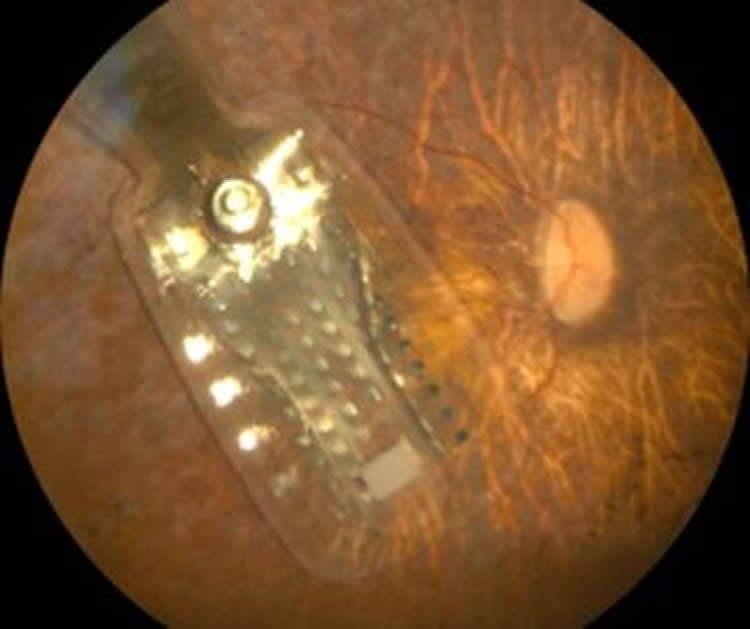Summary: A new study uses retinal prosthetics to assess the brain’s ability to process visual information years after blindness occurs.
Source: PLOS.
More than 40 million people worldwide are blind, and many of them reach this condition after many years of slow and progressive retinal degeneration. The development of sophisticated prostheses or new light-responsive elements, aiming to replace the disrupted retinal function and to feed restored visual signals to the brain, has provided new hope. However, very little is known about whether the brain of blind people retains residual capacity to process restored or artificial visual inputs.
A new study publishing 25 October in the open-access journal PLOS Biology by Elisa Castaldi and Maria Concetta Morrone from the University of Pisa, Italy, and colleagues investigates the brain’s capability to process visual information after many years of total blindness, by studying patients affected by Retinitis Pigmentosa, a hereditary illness of the retina that gradually leads to complete blindness.
The perceptual and brain responses of a group of patients were assessed before and after the implantation of a prosthetic implant that senses visual signals and transmits them to the brain by stimulating axons of retinal ganglion cells. Using functional magnetic resonance imaging, the researchers found that patients learned to recognize unusual visual stimuli, such as flashes of light, and that this ability correlated with increased brain activity.
However, this change in brain activity, observed at both the thalamic and cortical level, took extensive training over a long period of time to become established: the more the patient practiced, the more their brain responded to visual stimuli, and the better they perceived the visual stimuli using the implant. In other words, the brain needs to learn to see again.

The results are important as they show that after the implantation of a prosthetic device the brain undergoes plastic changes to re-learn how to make use of the new artificial and probably aberrant visual signals. They demonstrate a residual plasticity of the sensory circuitry of the adult brain after many years of deprivation, which can be exploited in the development of new prosthetic implants.
Funding: This research was funded by the European Research Council under the European Union’s Seventh Framework Programme (FPT/2007-2013) under grant agreement no. 338866 ECPLAIN (http://www.pisavisionlab.org/index.php/projects/ecsplain) and by the Fondazione Roma under the Grants for Biomedical Research: Retinitis Pigmentosa (RP)-Call for proposals 2013 (http://www.fondazioneroma.it/it/index.html, http://wf-fondazioneroma.cbim.it/), project title: “Cortical Plasticity in Retinitis Pigmentosa: an Integrated Study from Animal Models to Humans.” MCM received both these grants. The funders had no role in study design, data collection and analysis, decision to publish, or preparation of the manuscript.
Competing Interests: The authors have declared that no competing interests exist.
Source: M.C. Morrone – PLOS
Image Source: NeuroscienceNews.com image is credited to Castaldi E, Cicchini GM, Cinelli L, Biagi L, Rizzo S, Morrone MC (2016).
Original Research: Full open access research for “Visual BOLD Response in Late Blind Subjects with Argus II Retinal Prosthesis” by E. Castaldi, G. M. Cicchini, L. Cinelli, L. Biagi, S. Rizzo, M. C. Morrone in PLOS Biology. Published online October 25 2016 doi:10.1371/journal.pbio.1002569
[cbtabs][cbtab title=”MLA”]PLOS. “After Blindness, The Adult Brain Can Learn to See Again.” NeuroscienceNews. NeuroscienceNews, 25 October 2016.
<https://neurosciencenews.com/vision-neurogenesis-blindness-5349/>.[/cbtab][cbtab title=”APA”]PLOS. (2016, October 25). After Blindness, The Adult Brain Can Learn to See Again. NeuroscienceNews. Retrieved October 25, 2016 from https://neurosciencenews.com/vision-neurogenesis-blindness-5349/[/cbtab][cbtab title=”Chicago”]PLOS. “After Blindness, The Adult Brain Can Learn to See Again.” https://neurosciencenews.com/vision-neurogenesis-blindness-5349/ (accessed October 25, 2016).[/cbtab][/cbtabs]
Abstract
Visual BOLD Response in Late Blind Subjects with Argus II Retinal Prosthesis
Retinal prosthesis technologies require that the visual system downstream of the retinal circuitry be capable of transmitting and elaborating visual signals. We studied the capability of plastic remodeling in late blind subjects implanted with the Argus II Retinal Prosthesis with psychophysics and functional MRI (fMRI). After surgery, six out of seven retinitis pigmentosa (RP) blind subjects were able to detect high-contrast stimuli using the prosthetic implant. However, direction discrimination to contrast modulated stimuli remained at chance level in all of them. No subject showed any improvement of contrast sensitivity in either eye when not using the Argus II. Before the implant, the Blood Oxygenation Level Dependent (BOLD) activity in V1 and the lateral geniculate nucleus (LGN) was very weak or absent. Surprisingly, after prolonged use of Argus II, BOLD responses to visual input were enhanced. This is, to our knowledge, the first study tracking the neural changes of visual areas in patients after retinal implant, revealing a capacity to respond to restored visual input even after years of deprivation.
“Visual BOLD Response in Late Blind Subjects with Argus II Retinal Prosthesis” by E. Castaldi, G. M. Cicchini, L. Cinelli, L. Biagi, S. Rizzo, M. C. Morrone in PLOS Biology. Published online October 25 2016 doi:10.1371/journal.pbio.1002569






